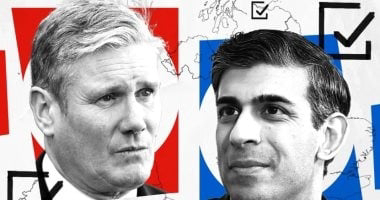The Guardian newspaper reported that Sunak is struggling to maintain control of his divided party on the chaotic sixth day of the Conservative party's election campaign, where a member of parliament defected and joined the Reform Party while a minister criticized the Prime Minister's pledge to reinstate national service.
Sunak was in Buckinghamshire where he sought to regain the lead after a painful start to the early elections, with insiders in the Conservative Party concerned about the state of affairs regarding his strategy and performance.
Sunak found himself under criticism, with Steve Baker, a Northern Ireland minister, saying that compulsory national service is a policy dreamed of by advisers and encouraged by candidates.
It later emerged that Baker, who defends Labour's goal in Wycombe, chose to go on vacation to Greece instead of staying on the campaign trail - after previously telling Sunak that parliament members must move forward and book a vacation.
Then Prime Minister faced a defection from Lucy Allan, Conservative MP for Telford, who said she would support the local Reform candidate. The party suspended her membership, but she responded saying she had resigned first, and that Conservatives have no chance in her seat, according to Shropshire Star.
Sunak's problems escalated further when he was accused by Zac Goldsmith, a former Conservative MP and minister who resigned due to his dissatisfaction with Sunak's environmental commitments, of "damaging the party in a way that is almost irreparable."
Goldsmith said: "The hope is that when Sunak disappears to California in a few weeks, at least some respectable MPs will remain who can be rebuilt around."
When he appeared in Amersham, where the Conservatives lost a by-election to the Liberal Democrats last year, Sunak ignored questions about defections and criticisms. However, he angrily responded to Goldsmith who predicted he would move to the United States if Conservatives lost the election, and pledged to stay in his position and serve a full term as a Member of Parliament.
On the other hand, the British Labour Party opened up applications for seats after six MPs announced their retirement at the last minute, with key allies expected to line up to take their places for party leader Keir Starmer.
Among those resigning are former shadow minister Barbara Keeley and parliamentary Labour Party chair John Cryer, as well as John Spellar, Virendra Sharma, and Kevin Brennan.
Julie Elliott, MP for Sunderland Central, also joined the retirees on Tuesday morning. High-level sources in the Labour Party expect announcements of several other departures within the next 24 hours.
The party also announced several other safe seats in London, including Stratford, Poplar and West Ham, and Brixton.
It is widely expected that several high-profile figures in the Labour Party will seek to fill seats in the coming days, including Josh Simons, influential director of Starmer-supporting research center First Labour, and Georgia Gould, leader of Camden Council.
Members of the party's governing National Executive Committee, who played an active role in changing party rules after Jeremy Corbyn's leadership, have also been nominated for seats.
This move is expected to raise controversy among critics who claim that Labour candidates - especially those holding comfortable seats - should be chosen with local input from grassroots members rather than simply handed over to leadership allies.
In February 2020, during his campaign to lead the Labour Party, Starmer said that Labour candidate selections should be "more democratic and we must end the imposition of the National Executive Committee on candidates. Local party members should choose their candidates in every election."
He added: "No power without accountability, and real accountability requires transparency."


